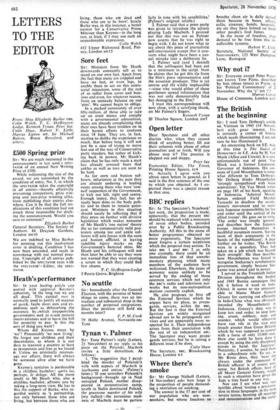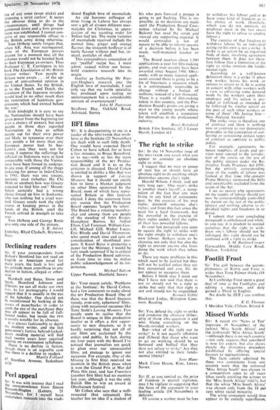The British at the beginning
Sir: I read Tom Driberg's article on Vietnam in 1945 (14 Novem- ber) with great interest. This is certainly a corner of history which needs illuminating. I am not sure he has illuminated it.
An interesting book on S.E. Asia at this time is The Stakes of Democracy in S.E. Asia by H. Van Mook (Allen and Unwin). It is now unfortunately out of print. Van Mook was a former Lieutenant- Governor of Indonesia. His esti- mate of Lord Mountbatten is some- what different to Tom Driberg's. Mr Driberg thinks Mountbatten `strongly sympathised with Asian aspirations'. Yet Van Mook writes on page 185 of his book, speaking of Indonesia, 'Admiral Mount- batten ordered Field Marshal Terauchi to disallow the revolu- tionary movement and to main- tain Japenese responsibility for law and order until the arrival of the allied troops'. He goes on to write, 'The order was simply ignored', and describes how the Japanese troops interned themselves in healthful mountain resorts, 'leaving most of their armaments in the hands of the republicans'. A page further on he writes. The British were in a quandary. They had taken on a job which was beyond their strength'. He then describes how Mountbatten was forced to recognise Soekarna's revolutionary government, simply because Soe- karno was armed and in power. I served in the Twentieth Indian Division throughout the Imphal and 1945 Burma campaigns (but left it before it went to Indo- China). It seems to me unreason- able to blame Major General Gracey for carrying out efficiently in Indo-China what was obviously intended (by Mountbatten) in Indonesia. Gracey's duty was to keep law and order, to stop loot- ing, arson, robbery, rape and murder, which would otherwise have run rife in the vast area (much greater than Great Britain) which he was supposed to .control with a force of only 15,000 men. How else could he have done it except by using the only disciplined troops to hand, the Japanese? Naturally, I assume, he used them in a subordinate role. To say. as Mr Rosie does, they *ere not always under the command of British 'officers' is of course non- sense. No British officer, least of all Mator General Gracey, would in such a situation have given the Japs a tree hand in any way. Nor can I see what was verY terrible about 'issuing aprthe most proclama- tion-
tion in three languages, in severe terms,. banning all meetings and demonstrations and the carer
ing of any arms (even sticks) and imposing a strict curfew'. It seems the obvious thing to do in the circumstances, until things had quietened down and a firm govern- ment was established. I cannot con- ceive of any responsible officer in the British army doing. otherwise.
Tom Driberg surely forgets that,
when S.E. Asia. was .reconquered, none ot the European powers dreamt for a moment that all the colonies would not be handed back to their European ex-owners. Thus . Professor C. E. Carririgton in his book The Liquidation of the British Empire writes: 'Few people in Britain were aware .. . of the up-
surge ot anti-colonial opinion in the United States. To the British, as to the French and Dutch, the expulsion of the Japanese invaders would lead to no other result than the restoration of legitimate gov- ernments which had existed before the war.'
With hindsight it is easy to say the Nationalists should have been given power from the beginning (or even a chance of power); but most people in those days regarded Nationalists in Asia as selfish people out for their own power and likely to tyrannise over their own people a lot more than any European poyver had. In Soe- karno's case they were not far wrong. I suppose the sufferings he inflicted on Indonesia were at least comparable with those the Vietna- mese have been forced to undergo. In any case, if among all the thugs jockeying for power in Indo-China in 1945. there was one sincere, patriotic man (whether Ho Chi Minh or another) how was Gracey expected to find him out? Mount- batten certainly had a wrong choice forced tip him in Soekarno, who. was nothing but a cruel war- lord. Gracey surely took the right course in keeping power in the hands of the British, until the French arrived in strength to take over.
Tom Driberg and George Rosie give only one side of the picture.
S. R. Atkins Enderley, Rhyd Clydach, Brynawr, Brecs















































 Previous page
Previous page